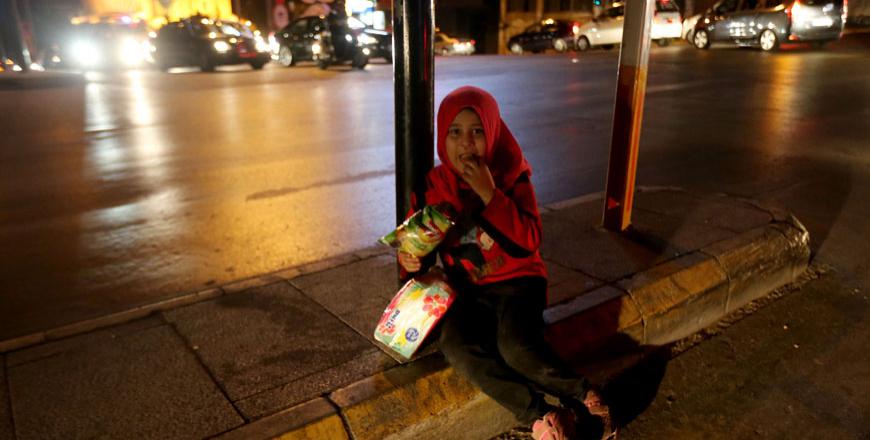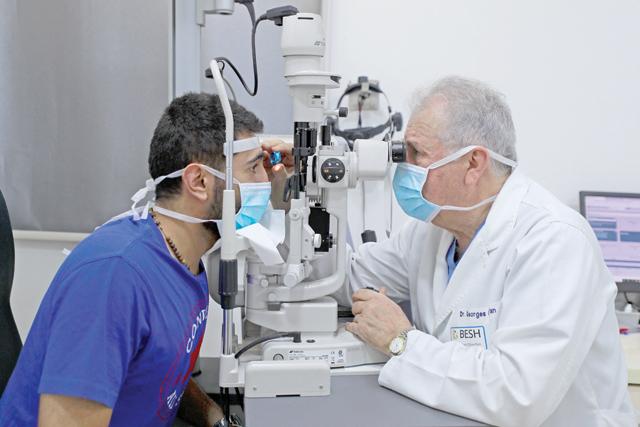You are here
Working children given a path off Lebanon’s streets
By AFP - Oct 25,2015 - Last updated at Oct 25,2015

A Syrian refugee girl sells tissue paper on a busy intersection in the Lebanese capital Beirut, on Saturday (AFP photo)
BEIRUT — For two years, Syrian teenager Ibrahim scraped together a paltry living selling lottery tickets and tissues on the crowded streets of Beirut, but that seems like a lifetime ago now.
The 18-year-old's life turned around after three months' training at a flower shop as part of an apprenticeship programme for vulnerable Lebanese and Syrian youths organised by an international humanitarian group.
"Among the flowers, I forget what happened to us. I forget our worries," Ibrahim said, gently arranging a bouquet.
He was one of 24 Syrian and Lebanese youths who took part in a training scheme organised by the International Rescue Committee (IRC) that took them off the streets and provided them with a small stipend.
IRC requested that the names of youths be changed for this story.
At a flower shop in the Cola district of the Lebanese capital, Ibrahim has learned how to clean and water flowers, then arrange them into beautifully designed bouquets.
"It really boosted my morale learning the basics of flower arrangement," he said quietly.
"In the streets, I used to hear really bad things. But here, I've learned mutual respect and a new trade."
At least 1,510 children, three-quarters of them Syrian, live or work in the streets of Lebanon, according to a report by UN agencies, NGOs and Lebanon's labour ministry published this year.
The report's authors said the real number of children on the streets could be up to three times higher than that.
Exposed to danger
At least 43 per cent of those on the street beg for money, and 37 per cent sell small items, like tissue paper or chewing gum.
Others carry grocery bags, shine shoes or operate small parking lots, with most making between $3 and $12 daily.
A number are exploited in illicit or illegal professions — including prostitution — earning between $21 and $36 per day.
Whatever their job, working and living on the street exposes children to danger and exploitation, including street accidents and sexual assault, according to experts.
IRC's Sara Mabger said the apprenticeship project sought to "give street youth an opportunity to learn a specific skill that will help them in their life, but also to minimise their hours of working in the streets".
Lebanon hosts more than one million Syrian refugees, many living in poverty and forced to send their children to work to make ends meet.
Raed, 16, arrived from Syria's second city Aleppo with his family three years ago.
He once shined shoes or sold things along the Beirut waterfront for cash to help support his father and five younger siblings, who live in the impoverished Shatila Palestinian refugee camp.
But in the programme, he also learned to tend flowers, at a shop in the Jnah area outside Beirut, and now he imagines one day owning his own storefront.
"I memorised all the names of the flowers, and I like chrysanthemums and liliums the best," he said with a smile as he sprayed rows of greenery sitting on shelves in the shop.
"I hope that when I return to Syria, I can open my own flower shop."
'Never return
to the street'
Local clothing stores, sweet shops, and cafes have taken part in the initiative.
Fadi Jaber, the 36-year-old manager of Jaber Flowers, said IRC proposed he take in Raed "to take him off the street and teach him the basics of the business, and we welcomed the idea."
"If he wants to work in this field, he will return to his own country with a trade, instead of wasting his future in the street," Jaber added.
The programme caters to Lebanese youth too, including 20-year-old Assaad, from a poor district of the northern city of Tripoli.
He has apprenticed at a modest bakery in central Beirut, helping to prepare bread for a steady stream of customers.
"I learned how to prepare the dough, how much salt you should use, and how to lay the bread out after baking," he said.
"Working here is better than staying at home or being in the street."
The man he is learning from is 30-year-old Syrian Qassem Mohammad, who owns the bakery and has lived in Lebanon for many years.
"I left Syria when I was young, but I found someone who gave me an opportunity. And in turn, I wanted to give this opportunity to someone who needs it," Mohammad said.
Although there is no guarantee participants will stay off Lebanon's streets, the organisers hope to receive enough funding to support those who want to continue training.
And for many, like Raed, the choice is clear.
"I swore I would never go back to the street again," he said.
Related Articles
TRIPOLI, Lebanon — Lebanon may be under a strict pandemic lockdown to stem raging coronavirus rates, but father-of-six Omar Qarhani is still
BAGHDAD — Iraq is becoming a land of opportunity for Lebanese job-seekers fleeing a deep economic crisis back home.Akram Johari is one of th
BAGHDAD — Iraq, once synonymous with conflict and chaos, is becoming a land of opportunity for Lebanese job-seekers fleeing a deep economic
















